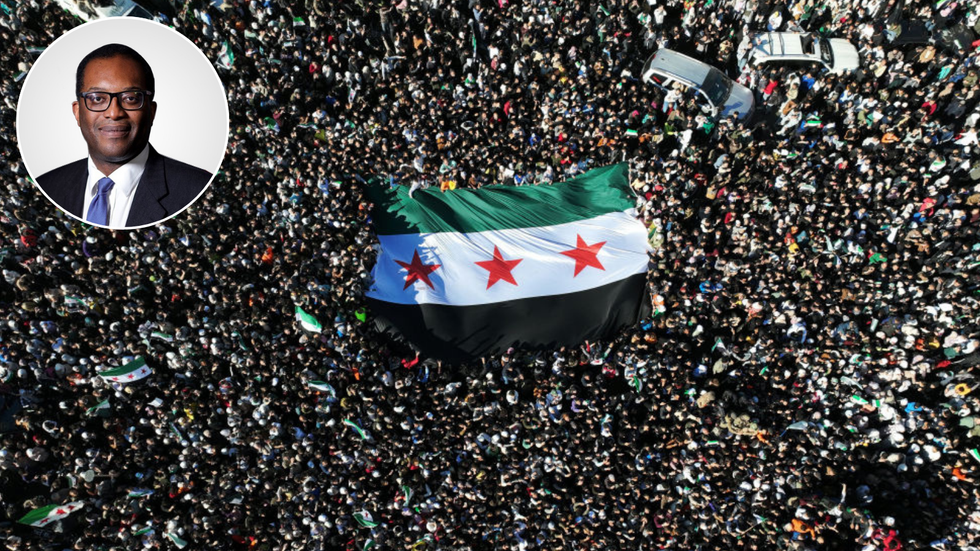The end, as it happened, was quick and decisive. Basher al Assad escaped with his family, leaving his gilded, chrome-filled palace and a fleet of red Ferraris and Lamborghinis in the garage. His army and close military aides were not informed of his plans. He told them to stand at their posts, while he slipped away.
Today Assad and his wife Asma reside in Moscow. One assumes they are living in style, as media reports suggest that the Assads have already acquired a portfolio of 18 luxury apartments in the Russian capital.
Their eldest son has just graduated from Moscow State University. Moscow is somewhere they will feel at home, though they will resent their total lack of power and their utter dependence on the goodwill of Putin. They have become irrelevant.

Kwasi Kwarteng says Syria could be the scene of more uncertainty, chaos and war.
GB News
The Syria they have left behind is not irrelevant, however. Devasted by 13 years of civil war, with over 500,000 dead, and over 10 million refugees, the country has been dragged through years of hell. The fall of Assad is being rightly celebrated but nobody has the faintest idea of what comes next.
The new emerging figure is a man who called himself Al-Jolani, who has embarked on quite a journey. A self-proclaimed jihadist , a member of Al-Qaeda, he has now trimmed his beard, ditched his headscarf and adopted the military fatigues favoured by Ukraine’s Zelenskyy. Only time will tell if such a change is sincere.
To me, it seems cynical to have been a proud jihadist since the age of 18, to have killed people in the name of Islam in your twenties and thirties, and then, in your early forties, to start projecting oneself as a tolerant statesman.
It doesn’t ring true. The Americans still have a $10m bounty on his head. But people do change and we have to hope that Al-Jolani’s conversion to tolerance is genuine.
Behind the leading figures, the picture is even more gloomy. Syria is splintered into different religious groups and ethnicities. Thrown into the mix are a number of international and regional powers.
The United States, Russia, Iran and Turkey all have troops on Syrian soil. The country, quite frankly , is a mess. It is unclear whether the confusion will end, or whether this is just the prelude to more chaos and bloodletting.
The Assads ruled the country with an iron fist for 54 years. They slaughtered and tortured hundreds of thousands in that time. They have now been toppled. Let’s not kid ourselves. Syria’s new masters won their position at the barrel of a gun, even if there was little actual bloodshed at the end, as Assad’s army disappeared into the night.
People in Britain might say, “who cares?”. It all seems very remote and intangible. This is short-sighted. What happens in Syria directly affects Europe and the UK. Immigration and the politics of militant Islam have dominated this young century.
What happens in the Middle East affects our lives in the form of the threat of terrorism, the phenomenon of migrants on dinghies hitting our shores and the effects of militant radicalism which is already here.
Colonel Gaddafi’s fall precipitated the collapse of the Libyan state which made the migrant problem from Africa even more acute, as the failed state has not been able to curb migrant flows in the way Gaddafi once did.
The civil war in Syria itself provided one of the backdrops of Brexit. It was Angela Merkel’s reckless decision to take 1m refugees from Syria into Germany that raised concerns about mass immigration in that country and helped the rise of the AfD.
Syria can rejoice at the fall of Assad. Tomorrow, that country could be the scene of more uncertainty, chaos and war. This would have disastrous consequences for Europe and the World.